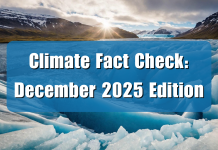
A tale of Guardianista Land…where everyone was equal. (But, some more equal than others) https://camera-uk.org/2011/01/24/a-tale-of-guardianista-land-where-everyone-was-equal-but-some-more-equal-than-others/
Once again, Fiona Harvey, the Guardian’s Environment Editor-cum-resident climate evangelist, has taken to the pages of her paper to deliver a sermon on the supposed settled science of climate change. In her latest missive, she trumpets the pronouncements of André Corrêa do Lago, Brazil’s diplomat who will preside over the United Nations climate summit (30th Conference of the Parties or COP30) in November this year.
Ms Harvey claims that “climate denialism” has been defeated by the weight of “scientific consensus” and now the deniers are resorting to the argument that climate policies cannot shift the global economy to a low-carbon future. Thus, according to Corrêa do Lago: “It is not possible to have [scientific] denialism at this stage, after everything that has happened in recent years. So there is a migration from scientific denial to a denial that economic measures against climate change can be good for the economy and for people.”
Ms Harvey, steeped in the familiar dogma of climate alarmism, reels off the usual tropes: “As the climate crisis has gathered pace, temperatures have risen and the effects of extreme weather have become more obvious, scientists have been able to draw ever more clearly the links between greenhouse gas emissions and our impacts on the planet.”
The new twist to the climate alarmist narrative pushed by her in her interview of Corrêa do Lago is that we are now witnessing the last gasp of a defeated ideology of climate denialism. The denial of scientific consensus in now replaced by the denial of enlightened climate policies which would bring the avoidance of impending environmental catastrophe while promoting resilient economic growth. In his exclusive interview with the Guardian, the Brazilian diplomat asserts that this “economic denial” could be just as dangerous and cause as much delay as repeated attempts to deny climate science in previous years.
But the Science is Not Settled…
In Ms Harvey’s universe – occupied by the likes of Corrêa do Lago, Greenpeace and the UK’s very own ‘Mad Ed’, the Secretary of State for Energy Security and Net Zero – the science is settled, the energy transition is an imperative and decarbonisation will not only save the planet from an impending environmental catastrophe but also bring about economic growth and prosperity. Harvey’s article hinges on the tired assertion that the science of climate change is settled, with a ‘97% consensus’ among scientists that human activity drives catastrophic global warming. This figure, derived from John Cook’s 2013 study, has been debunked repeatedly for its methodological flaws — most notably by scholars like David Legates, who found that only a tiny fraction of the studied papers explicitly endorsed the catastrophic narrative.
William Happer, a Princeton physicist, has demonstrated that CO2’s warming effect is logarithmic, diminishing with increased concentration, and that current levels are far from catastrophic. Judith Curry, a former Georgia Tech climatologist, has meticulously documented the uncertainties in climate models, particularly their overreliance on assumptions about positive feedback loops. Nobel laureate John Clauser has called the climate crisis narrative “pseudoscience”, arguing that it ignores fundamental principles of physics. These are not fringe voices but eminent scientists whose peer-reviewed work is grounded in observable evidence, not ideological fervour.
The ‘settled science’ that Ms Harvey and Mr Corrêa do Lago take for granted is an oxymoron, as Michael Crichton reminded his audience at the California Institute of Technology in 2003: “There is no such thing as consensus science. If it’s consensus, it isn’t science. If it’s science, it isn’t consensus. Period.”
But perhaps the most careful recent look at ‘settled science’ has been by Steve Koonin in his book Unsettled, where he marshals scientific facts supported by hard data and the peer-reviewed literature that stand against the reigning climate change narrative. He finds that the rate of sea-level rise has not accelerated; humans have had no detectable impact on hurricanes over the past century; tornado frequency and severity are not trending up; Greenland’s ice sheet isn’t shrinking any more rapidly today than it was 80 years ago; the number and severity of droughts are not rising over time; the extent of global fires has been trending significantly downwards; global crop yields are rising, not falling; the net economic impact of human-induced climate change will be minimal through at least the end of this century even if global average temperatures rise by 3°C, which is double the Paris Agreement goal.
…And Climate Policies have brought Widespread Misery and Pushback
Corrêa do Lago, we are informed, wants to spur a new global effort to persuade people that remodelling the economy away from a reliance on fossil fuels and towards a clean energy future will reap benefits for all people. “It’s the turn of those who believe in the fight against climate change to show and to prove that fighting climate change is possible, and that it can come with economic advantages and with a better quality of life.”
In preparing for the gabfests that the annual UN climate summits have become known for, Mr. Corrêa do Lago blames the deniers for the “concerted attack on the idea that the economy can be reorganised to fight the [climate] crisis”. In attempting to gather 196 countries to pursue the kind of climate policies that support the globalist agenda touted by the likes of the Guardian, Corrêa do Lago lays blame on “the new populism” that is trying to show climate policies of decarbonisation do not work.
Among these “new populists”, of course, President Donald Trump looms large, calling the UN-touted global climate policies as the “Green New Scam”, pulling the US out of the 2015 Paris Agreement and putting the final nail in the coffin of the global climate agenda. Ms Harvey rues what she calls the “geopolitical headwinds” facing COP30, with the Trump administration having “emboldened countries that wish to derail progress”. Among what she calls the “possible mischief makers”, she lists “Saudi Arabia, Russia, Argentina, Venezuela and a host of other countries, including petrostates and populist-leaning governments”.
Previous UN climate jamborees have seen the promises of Net Zero collide with the hard realities of rapidly expanding energy demand especially in the developing world. For instance, Dr Sultan Al Jaber, the president of the COP28 climate summit, said pointedly in response to questions from a UN special envoy for climate change: “There is no science out there, or no scenario out there, that says that the phase-out of fossil fuel is what’s going to achieve 1.5°C.” He further said off-camera in an interview that: “You’re asking for a phase-out of fossil fuels… Please, help me, show me for a phase-out of fossil fuel that will allow for sustainable socio-economic development, unless you want to take the world back into caves.”
Neither Ms Harvey nor Mr Corrêa do Lago seems to be aware, or willing to admit an awareness, of the widespread reaction in Western Europe against the depredations of punitive climate policies that have escalated the cost-of-living crisis here. The rise of conservative-populist parties in Austria, Italy, the Netherlands, Hungary, Poland, France, Germany and the UK is at least in part explained by the sheer economic immiseration among working and middle class households caused by high energy and electricity prices. The modern Western barbarism of an enforced energy starvation diet is being exposed and increasingly challenged not only in the US under the Trumpian counter-revolution but increasingly in other parts of the world as well, from Argentina to New Zealand.
The recent blackouts in the Iberian Peninsula further expose the folly of over-reliance on renewables. Spain and Portugal suffered massive blackouts – Western Europe’s worst in post-war history – due to insufficient grid inertia. This was a direct result of prioritising wind and solar over dispatchable sources like coal, gas and hydropower. As reported by the Telegraph, the Spanish socialist Government was probing how far it could push reliance on renewables in preparation for the country’s rushed phase-out of nuclear reactors from 2027.
To add further to the folly of the ‘energy transition’ proponents such as Ms Harvey and Mr Corrêa do Lago, the recent IEA report underscores the surging electricity demand from AI data centres, projecting a doubling of global power needs by 2030. Europe’s climate policies, which reduce reliable dispatchable power, are spectacularly ill-timed, leaving the continent unprepared for this technological shift.
The Guardian Preaching to the Choir
Fiona Harvey’s article is not journalism but propaganda, a paean to the climate cult that mistakes consensus for truth. COP30, like its predecessors over the past three decades, will likely produce more platitudes than actionable results. The real desperation lies not with sceptics but with those who cling to a narrative unsupported by physics, economics or data. The climate crisis is a construct of ideology, not science. It’s time for the Guardian to abandon its dogmatic crusade and engage with the evidence, as unlikely as that would be. Until then, Ms Harvey’s sermons will remain just that — preaching to the choir.
This article was first published in the Daily Sceptic (https://dailysceptic.org/2025/06/03/the-guardians-climate-cult-fiona-harveys-latest-sermon-on-cop30/)
























